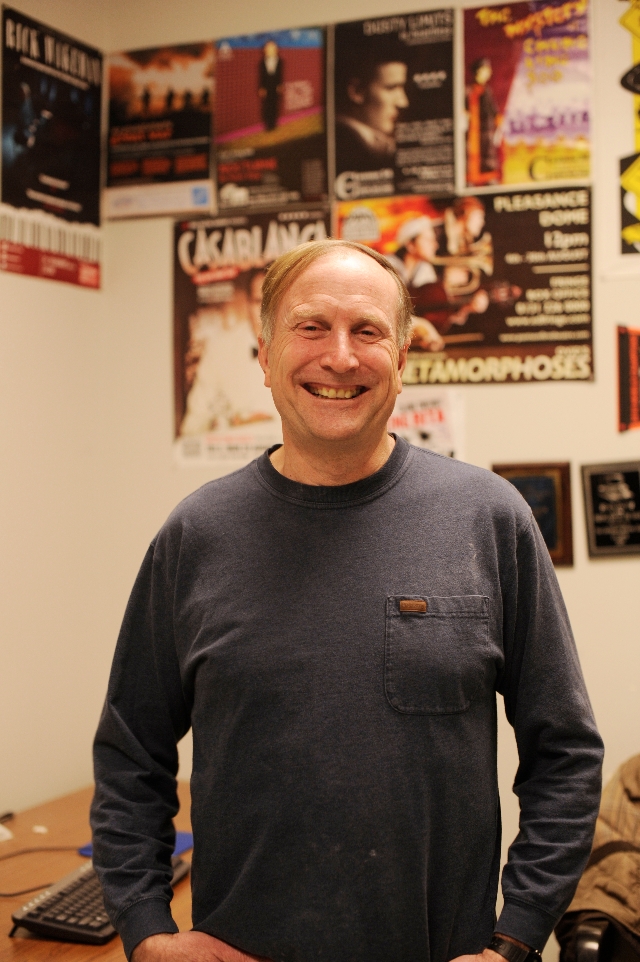UC Davis continuing lecturer Sean Davis watches 160 to 200 plays every August. For the rest of the year, he teaches computer science.
“I think I am lucky enough to be gifted with a wide range of interests,” Davis said. “I’m a general contractor, I review plays and I teach computer science.”
Like many undergraduate students on campus today, Davis started in the 1970s with no specific major interests. After bouncing from chemical engineering to history, Davis graduated with a Bachelor of Arts psychology degree in 1978, having zero idea that one day he would rejoin the Aggie community as a faculty member in the College of Engineering.
“It’s kind of cool because you realize that he absolutely didn’t know what he wanted to do at our age,” said second-year animal biology and computer science double major Russell Miller, who took Engineering Computer Science (ECS) 30: Programming and Problem Solving and ECS 50: Machine Dependent Programming with Davis. “He had a very generalized education, and learned most of the computer science he knows now on his own.”
Davis picked up a keen interest in computers and programming after graduation, fostered by his purchase of a small computer from the children’s store, Toys “R” Us. After some self-teaching and experimenting with various projects, Davis applied to the UC Davis Ph.D. program in computer science, but ended up getting a master’s degree and teaching ECS classes in 1994.
Davis described his teaching style as active and crazy. He said he doesn’t mind suddenly jumping up in class or walking up and down the aisles of the lecture hall in an attempt to grab students’ attention.
“When he teaches, he is more of a casual teacher, he doesn’t just lecture from his slides. It’s really nice and easy to pay attention to if you want to,” Miller said. “I think that even though he’s one of the hardest teachers, he is also considered one of the best teachers.”
Apart from teaching, Davis enjoys dabbling in subjects outside of computer science quite often. One such interest lies in Scottish theater, specifically plays on showcase at The Fringe Festival in Edinburgh, Scotland.
“The Fringe is marvelous. It’s so different, that it is unlike any other situation,” Davis said. “Those people are there to present plays because that’s what they want to do.”
As the largest arts festival in the world, The Fringe boasts theatrical and comedy acts, as well as dance and music performances over the entire month of August. Just last year, over 45,000 performances of close to 3,000 shows were presented, and nearly two million tickets were sold.
Since 2005, Davis has attended the festival from start to finish, watching anywhere from 160 to 200 plays over the entire month and averaging between six and 10 plays each day.
“I was a big moviegoer and then I discovered plays because they can be wilder. The suspension of disbelief is greater for a play than it is for a movie,” Davis said. “I’m a novelty seeker. The Fringe has not failed me.”
Davis is joined at the festival every year by his friend and theater buff Tim Emm, who chooses about half to two-thirds of the plays they watch together.
“Sean is a great companion as he would describe himself the loud American willing to talk to anyone and me the slightly more reserved English man discussing background and providing lots of theatre trivia,” Emm said in an email interview. “I choose the plays based on my knowledge of up and coming playwrights, particular actors I find interesting and the reputation of certain venues plus a few random experiments. I like having a mix of fringe and international festival productions.”
Venues at the festival can range from 1,000-person auditoriums and smaller conference rooms to caves beneath bridges holding close to 40 viewers. Despite this, the average audience size is just four during the festival, because smaller shows happening in the city’s outskirts don’t attract as many viewers.
“Sean’s approach is to take a venue and see everything in it that day — pretty much going in blind not knowing anything about it — a true fringe adventurer looking for the undiscovered gems,” Emm said.
After watching each play, Davis takes mental notes on what he liked and didn’t like. At the beginning of every day, he updates these comments onto his website, fringefan.com.
“He keeps to a couple of lines of text, a star rating and constantly lists them in the order that he has enjoyed them,” Emm said. “I do read it particularly if he arrives at the festival before me to get a flavour of the festival from his perspective.”
Davis’ short comments give readers a quick overview of what the piece’s highlights were. Website visitors can also see rankings of the previous Fringe festivals.
“Last year, I had about 1,000 people who read it. Most people can’t go to the festival for the whole month, so the website is like a service for them,” Davis said. “I want to go in and ask ‘how does an average Joe see the play?’”
Even though there is hard work involved in the venture, Davis made it clear the work is rewarding.
“Sean is an enthusiast, throwing himself full pelt into the festival atmosphere — talking to people in the queue getting their word of mouth tips and recommending shows,” Emm said. “He has no pretensions and doesn’t analyse plays in an academic way but describes how he responds to a play or artist.








[…] UC Davis computer science lecturer moonlights as Fringe Festival blogger UC Davis continuing lecturer Sean Davis watches 160 to 200 plays every August. For the rest of the year, he teaches computer science. “I think I am lucky enough to be gifted with a wide range of interests,” Davis said. “I'm a general contractor, I … Read more on The Aggie […]